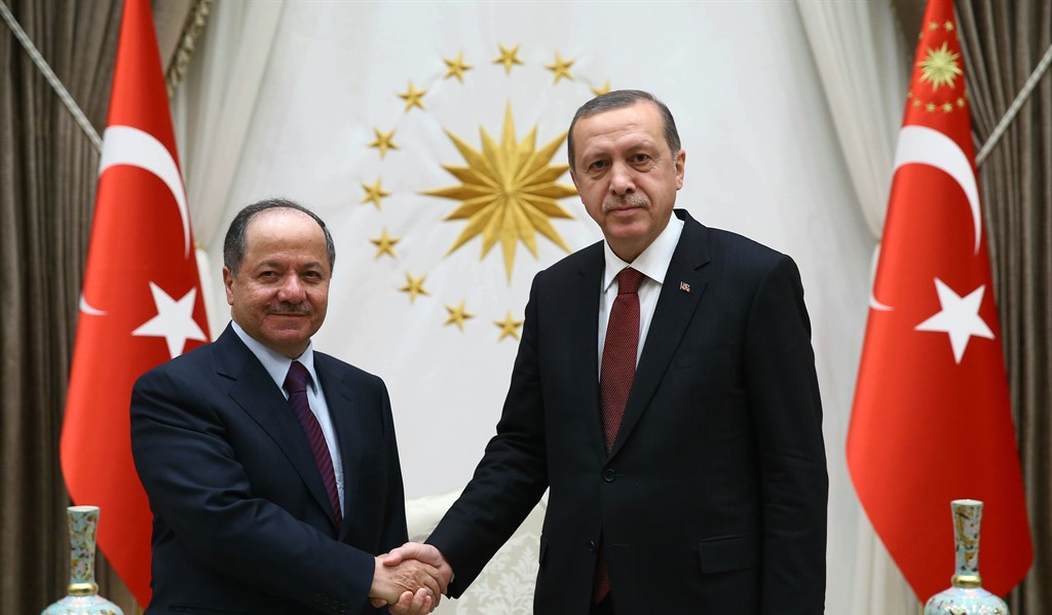Forget the Fourth of July — mark your calendars for September 25th for some real fireworks. After years of attempting to work within the US-built federal system in Iraq, the Kurds in the northern region have decided they like autonomy so much that they want to make it official. The president of the regional government announced on Twitter today that they will hold a referendum on independence — and a rather bland statement from Baghdad makes it sound like they won’t put up much of a fight:
The referendum on whether to secede from Iraq will be held in the three governorates that make up the Kurdish region and in the areas that are disputed by the Kurdish and Iraqi governments but are currently under Kurdish military control.
It is not clear whether a ‘yes’ vote, which is expected to be the result, will lead to the declaration of independence. The Iraqi government has so far not reacted to the announcement. Iraqi Prime Minister Haider al-Abadi said in April that he respects the Kurdish right to vote on independence, but he did not think the timing was right for the move.
Iraq’s Kurdish region, with a population of about 5 million, already enjoys a high degree of autonomy, including its own parliament and armed forces. But relations with the central government in Baghdad have nosedived in recent years over a range of issues. These include the sharing of oil revenues and the control of some areas that are technically part of federal Iraq but have come under Kurdish control since 2014 during the war against the Islamic State group.
And you thought the Qatar crisis could create a bombshell in the Middle East. Both Turkey and Syria have suppressed separatist Kurdish movements for decades, and Turkey in particular opposes even the autonomy under which the Iraqi Kurds have operated since the 1991 Gulf War, and officially so since the 2003 Iraq War finally deposed Saddam Hussein. This was one of the outcomes Turkey predicted from having the US back the Kurds on both occasions and in the Syrian fight against ISIS.
What will Recep Erdogan do if the Iraqi Kurds declare independence? He might go to war with them, as he has repeatedly threatened to do with the YPG, which the US is now arming for the fight in Raqqa. His prime minister Binali Yildrim reiterated that threat two days ago:
Prime Minister Binali Yildirim said on Tuesday Ankara will retaliate immediately if the operation by U.S.-backed forces to capture Raqqa, Islamic State’s de facto capital in Syria, presents a threat to Turkey.
Speaking to deputies from the ruling AK Party after the Syrian Democratic Forces (SDF) said they had launched their battle for Raqqa, Yildirim said Turkey was taking the necessary measures on the issue.
Turkey could also just choose to choke off independence through the time-honored leverage of petroleum:
Kurdistan exports most of its oil via a pipeline leading to the Turkish port of Ceyhan, but also overland through Turkey by tanker truck. …
Turkey has a large Kurdish minority with which the government has been engaged in a multi-decade armed conflict, and Ankara would almost certainly fear that Iraqi Kurdish independence could fuel increased calls for a similar move within its territory.
Due to how Iraqi Kurdistan exports its oil, Turkey potentially has both an effective veto over independence in general, and a ready means to apply huge pressure to any fledgling state’s economy if it did split from Iraq.
The rather milquetoast response from al-Abadi notwithstanding, Baghdad and Iran might have some serious issues with this idea, too. The Kurds claim more territory for their autonomy than Baghdad has ever conceded, and some of it — Kirkuk in particular — is rich in oil that Baghdad needs for its own purposes. Barzani made it clear that those disputed territories will take part in the referendum, too:
The statement from the regional presidency highlighted one of the main issues, saying the referendum would be held “in the Kurdistan region and areas of Kurdistan outside the administration of the region”.
This is a reference to swathes of northern territory that are claimed by both Kurdistan and Baghdad, including the key oil-rich province of Kirkuk.
There would be opposition in Baghdad to the three provinces that make up Kurdistan becoming independent, but that opposition would be vastly greater if the region tried to take disputed territory along with it, as it almost certainly would.
It’s not just the money, but security issues as well. The Kurdish peshmerga is also the most effective part of the Iraqi military, and its loss to a new state would immediately make Kurdistan a military threat to an already-weak Baghdad, which isn’t going to sit well in Iran. Furthermore, the Sunni tribes that finally shook off ISIS but still chafe under the Shi’ite-majority government in Baghdad might get happy feet too if al-Abadi lets the Kurds walk away from the federation. That would create Joe Biden’s tri-state outcome without any real planning to smooth the way, and border fights would almost certainly erupt between all three to set the boundaries for the three quasi-states.
Even so, the sudden US withdrawal from Iraq in 2011 leaves no doubt that all of these sectarian and religious factions have no one on which to rely but themselves. The dismemberment of Syria has accelerated that issue, and independence movements are now all but inevitable. The Kurds don’t want to end up under the thumb of Iran, and the Sunnis don’t want to end up under the thumb of the Shi’ites. At this point, it might be better to channel those impulses constructively to ensure that the Sunnis don’t simply adopt an ISIS-style leadership, but have the resources and the latitude to develop into a more responsible state after the Kurds depart Iraq. It’s going to get really interesting over the next few years.







Join the conversation as a VIP Member